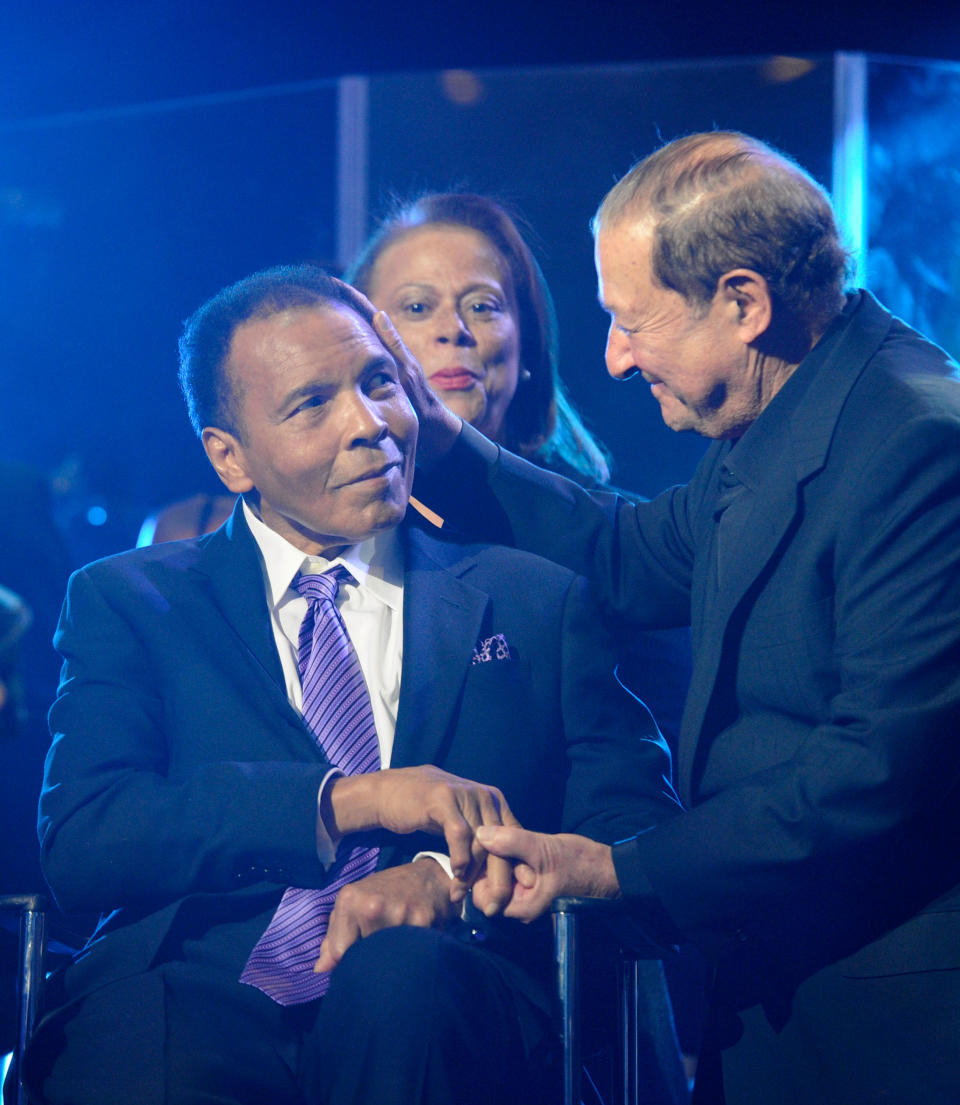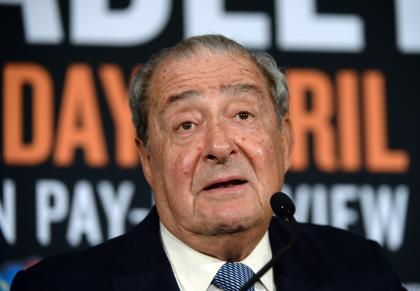How NFL legend Jim Brown pushed Bob Arum into boxing promotion
LAS VEGAS – Bob Arum’s 50th anniversary as a boxing promoter is on Tuesday, which is also the day he saw his first match in person.
How Arum, a New York City tax attorney who had served in the Kennedy Administration, came to be the most iconic promoter in the sport’s history involves the greatest running back in NFL history, the sale of Maple Leaf Gardens, a couple of NHL Hall of Famers, the World’s Fair, famed trial lawyer Louis Nizer, a bout that was for the world title everywhere but where it was held and, of course, the most famous boxer of all-time.

The story begins, depressingly enough, with one of the world sanctioning bodies stripping a champion of a belt he won in the ring.
Muhammad Ali had defeated Sonny Liston in what remains one of the great upsets in boxing history in 1964. When Ali gave Liston an immediate rematch, the WBA stripped him of his crown.
The WBA then sanctioned a fight between Ernie Terrell and Ernie Machen for its vacant belt.
“The same kind of B.S. we put up with now,” Arum said of Ali being stripped.
Terrell won the belt and was scheduled to make his first defense against Canadian George Chuvalo on Nov. 1, 1965. There were, typically, many problems associated with the fight. The Ontario Boxing Commission deemed Chuvalo unqualified to fight for the title.
So, after a long battle, it was deemed to be a non-title fight in Ontario, but was recognized as a championship match everywhere else.
Arum had just joined the New York law firm of Phillips, Nizer, Benjamin, Krim and Ballon. Nizer was one of the country’s most prominent attorneys and for a while was listed in the Guinness Book of World Records as the highest-paid lawyer in the country.
The company that had the rights to the Terrell-Chuvalo closed circuit retained Phillips and Co. The fight wasn’t doing too well, and Arum was asked if he had an idea that would help it generate some attention.
“This was 1965, and there had never been a black person who had been a commentator on a television broadcast and so I suggested they hire a prominent black athlete,” Arum said.
He suggested then-San Francisco Giants outfielder Willie Mays, but he was unavailable. Eventually, a lawyer friend of Arum’s suggested Cleveland Browns running back Jim Brown, and a deal was reached.
Brown and Arum quickly became friends, and after Terrell defeated Chuvalo, Brown made a remark to Arum that would change boxing history.
“He said to me, ‘You shouldn’t be the lawyer for this kind of company, you should be the promoter,’ ” Arum said.
The first fight Arum ever saw was Terrell-Chuvalo, and he watched that from the television truck.
“I told him I knew nothing about boxing, I had no interest in boxing and that the only person I would even consider doing that for would be Muhammad Ali,” Arum said.
That was no problem for Brown. Brown and Ali were close, and Brown knew that Ali was in need of someone sharp to promote him. Brown arranged a meeting and the rest was history.
After meeting with Elijah Muhammad, the Nation of Islam’s leader, Arum created a company called Main Bout and agreed to promote a title bout between Ali and Terrell in Chicago, where Elijah Muhammad lived.
That, though, was fraught with problems. This was during the Vietnam War, and Ali’s draft status had been reclassified from 1-Y, meaning he was unfit to serve, to 1-A, meaning he was eligible.
Ali was training at the famous Fifth Street Gym in Miami, preparing for the Terrell bout, when the draft board reclassified him.
“He was functionally illiterate at the time, which is why he was 1-Y,” Arum said. “But there were a lot of people who kept wondering why this big, famous athlete was not eligible to serve in the Army.”
On the day that the draft board reclassified Ali, Bob Halloran was a local television sports reporter in Miami. Halloran would later work for years in boxing, working for Caesars Palace, the MGM Grand and Wynn Las Vegas.
But at the time, he was a reporter who sensed a big story. He headed to Ali’s home to interview him about the draft board’s decision. When he got there, he was the only reporter and, hoping to maintain his exclusivity, pulled the phone jack out of the wall. This prevented anyone from the outside from reaching Ali.
During the interview with Halloran, Ali first used the phrase, “I ain’t got no quarrel with the Viet Cong. They never called me [expletive].”

That created a national firestorm. Chicago Mayor Richard Daley demanded that the Illinois Athletic Commission refuse to sanction the bout, which it did. Arum appealed, and arranged for the fight to be permitted if Ali apologized to the commission.
“We flew him in to Chicago from Florida, so he could make amends and apologize and get everything straightened out,” Arum said. “But before we saw him, he met with Elijah Muhammad. And of course, having been instructed by the honorable Elijah Muhammad, he made things even worse.”
So the fight was not only booted out of Chicago, it wasn’t allowed anywhere in the U.S. Montreal Mayor Jean Drapeau agreed it would be OK for his city to host the bout, and plans were set in place to hold it there.
But Montreal was planning to hold Expo ’67 there the next year. When the American Legion heard the fight was going to be held in Montreal, it vowed to organize a massive boycott of Expo ’67. Drapeau then withdrew his support for the bout.
Arum next planned to have it in Verdun, a Montreal suburb, whose mayor was open to it. But pressure mounted on the mayor, who like Drapeau, withdrew support.
Harold Ballard, the iconoclastic owner of the Toronto Maple Leafs and an NHL Hall of Fame member, reached out to Arum and offered to host the bout. Arum agreed, but then Ballard’s partner, a veteran and fellow Hall of Fame member Conn Smythe, objected.
Ballard had to buy out Smythe’s remaining interest in Maple Leaf Gardens in order to proceed.
The American Legion organized a boycott of all venues that planned to show the closed circuit. Since the fighters in those days were paid only on percentage, Terrell realized he’d make very little and pulled out.
So Chuvalo was chosen as his replacement. But in order to do hold it in Toronto, the Ontario parliament needed to approve it. After a contentious debate, it passed by one vote.
So, on March 29, 1966, 50 years ago on Tuesday, Ali successfully defended the world title by defeating Chuvalo, whom he’d dubbed “The Washerwoman,” by a unanimous decision.
That fight set Arum off on a promotional career that led him to promote nearly 10,000 bouts on six continents and landed him in the International Boxing Hall of Fame.
He promoted a slew of Ali fights and even created a public company in association with Ali called “Champ Burger,” which the pair planned to operate to compete with McDonald’s.
The public offering raised about a million dollars, Arum said, and stores opened.
“Needless to say, it was a disaster and didn’t last long,” Arum said of that idea.
And it all began when Arum simply made a suggestion on how to garner attention for a hard-to-sell fight.
It’s not much different from what he did the next 50 years.



